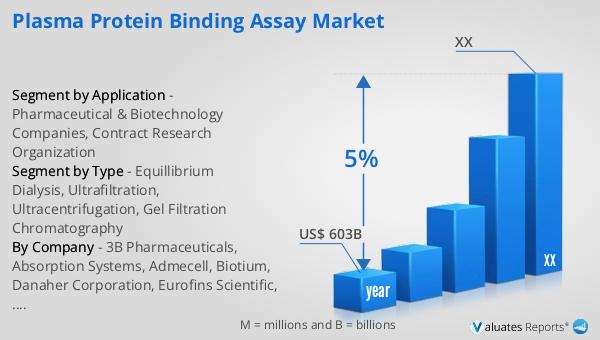What is Global Plasma Protein Binding Assay Market?
The Global Plasma Protein Binding Assay Market is a specialized segment within the broader pharmaceutical and biotechnology industry, focusing on the analysis and measurement of the extent to which drugs or other compounds bind to plasma proteins in the blood. This binding is crucial because it influences the drug's distribution, efficacy, and elimination from the body, impacting its overall therapeutic effect. Plasma protein binding assays are essential tools in drug development and pharmacokinetics, helping researchers and developers understand how a candidate drug will behave in the human body. These assays provide vital data that can predict a drug's safety and effectiveness, guiding dosage recommendations and helping to identify potential drug-drug interactions. As such, the market for these assays is driven by the continuous need for new drug development and the growing emphasis on precision medicine, where understanding the specifics of drug interaction with plasma proteins can lead to more personalized and effective treatment plans.

Equillibrium Dialysis, Ultrafiltration, Ultracentrifugation, Gel Filtration Chromatography in the Global Plasma Protein Binding Assay Market:
Equilibrium Dialysis, Ultrafiltration, Ultracentrifugation, and Gel Filtration Chromatography are key techniques used in the Global Plasma Protein Binding Assay Market, each with its unique approach to measuring how drugs bind to plasma proteins. Equilibrium Dialysis is a widely used method for its simplicity and accuracy, where a drug is allowed to reach an equilibrium state between a plasma-containing chamber and a buffer chamber, helping determine the free and bound fractions of the drug. Ultrafiltration involves passing a solution of the drug and plasma through a filter that retains the protein-bound drug while allowing free drug molecules to pass through, which are then quantified. Ultracentrifugation, a more complex and sensitive technique, separates bound from free drug molecules by spinning the plasma-drug mixture at high speeds, using the differences in mass to segregate them. Lastly, Gel Filtration Chromatography separates molecules based on size as they pass through a gel matrix, allowing for the determination of bound and unbound drug fractions. Each of these methods offers different advantages and is chosen based on the specific requirements of the study, such as the expected binding affinity, the size of the drug molecule, and the available equipment and expertise. These techniques are critical in the drug development process, providing essential data that informs dosage, efficacy, and safety profiles of potential new drugs.
Pharmaceutical & Biotechnology Companies, Contract Research Organization in the Global Plasma Protein Binding Assay Market:
In the Global Plasma Protein Binding Assay Market, Pharmaceutical & Biotechnology Companies, and Contract Research Organizations (CROs) are primary users, leveraging these assays to enhance drug development processes and ensure safety and efficacy. For Pharmaceutical & Biotechnology Companies, understanding the plasma protein binding properties of new drug entities is crucial. It informs various stages of drug development, from initial screening to clinical trial design, helping to predict how a drug behaves in the human body, its potential interactions with other drugs, and optimal dosing strategies. This information is vital for developing effective and safe medications, reducing the risk of adverse reactions, and improving therapeutic outcomes. On the other hand, Contract Research Organizations play a pivotal role by providing specialized services in conducting plasma protein binding assays for drug developers. These organizations offer expertise and advanced technologies to accurately assess drug-protein interactions, supporting pharmaceutical and biotech companies in navigating the complex regulatory requirements and accelerating the drug development timeline. By outsourcing these assays to CROs, drug developers can focus on their core competencies while ensuring that their compounds are thoroughly evaluated for plasma protein binding characteristics, which is essential for successful drug approval and commercialization.
Global Plasma Protein Binding Assay Market Outlook:
Our research indicates that the global market for medical devices is currently valued at approximately US$ 603 billion as of the year 2023. This market is on a positive trajectory, expected to expand at a compound annual growth rate (CAGR) of 5% over the next six years. This growth reflects an increasing demand for medical devices across various healthcare sectors, driven by technological advancements, an aging global population, and a rising focus on healthcare quality and accessibility. The expansion of the market is also supported by continuous innovations in medical technologies, including wearable devices, telehealth, and personalized medicine, which are becoming increasingly integral to patient care. As healthcare systems worldwide strive to improve patient outcomes and efficiency, the demand for advanced medical devices that offer more precise diagnostics, improved therapeutic options, and enhanced patient monitoring is expected to rise significantly. This growth trajectory underscores the importance of ongoing investment in research and development within the medical device sector to meet the evolving needs of the global healthcare landscape.
| Report Metric | Details |
| Report Name | Plasma Protein Binding Assay Market |
| Accounted market size in year | US$ 603 billion |
| CAGR | 5% |
| Base Year | year |
| Segment by Type |
|
| Segment by Application |
|
| By Region |
|
| By Company | 3B Pharmaceuticals, Absorption Systems, Admecell, Biotium, Danaher Corporation, Eurofins Scientific, GE Healthcare, Htdialysis, Merck, Sovicell GmbH, Thermo Fisher Scientific |
| Forecast units | USD million in value |
| Report coverage | Revenue and volume forecast, company share, competitive landscape, growth factors and trends |
